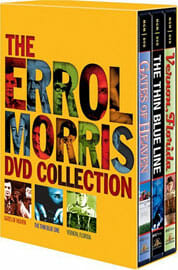The Errol Morris DVD Collection

The Big Picture: New box set from one of the great American documentary filmmakers
Director: Errol Morris
Cinematography: Gates of Heaven: Ned Burgess; Vernon, Florida: Ned Burgess; The Thin Blue Line: Robert Chappell, Stefan Czapsky.
Studio information: MGM, 3 films on 3 discs.
Errol Morris is certainly one of the great American documentary filmmakers, and every time I revisit his first three films—1980’s Gates of Heaven, 1981’s Vernon, Florida, and 1988’s The Thin Blue Line—which are available on DVD in a new box set, I’m struck most by how firmly his technique was in place right from the start.
-

-

-

-

-

-

-

-

-

-

-

-

-

-

-

-

-

-

-

-

-

-

-

-

-

-

-

-

-

-

-

-

-

-

-

-

-

-

-

-








































